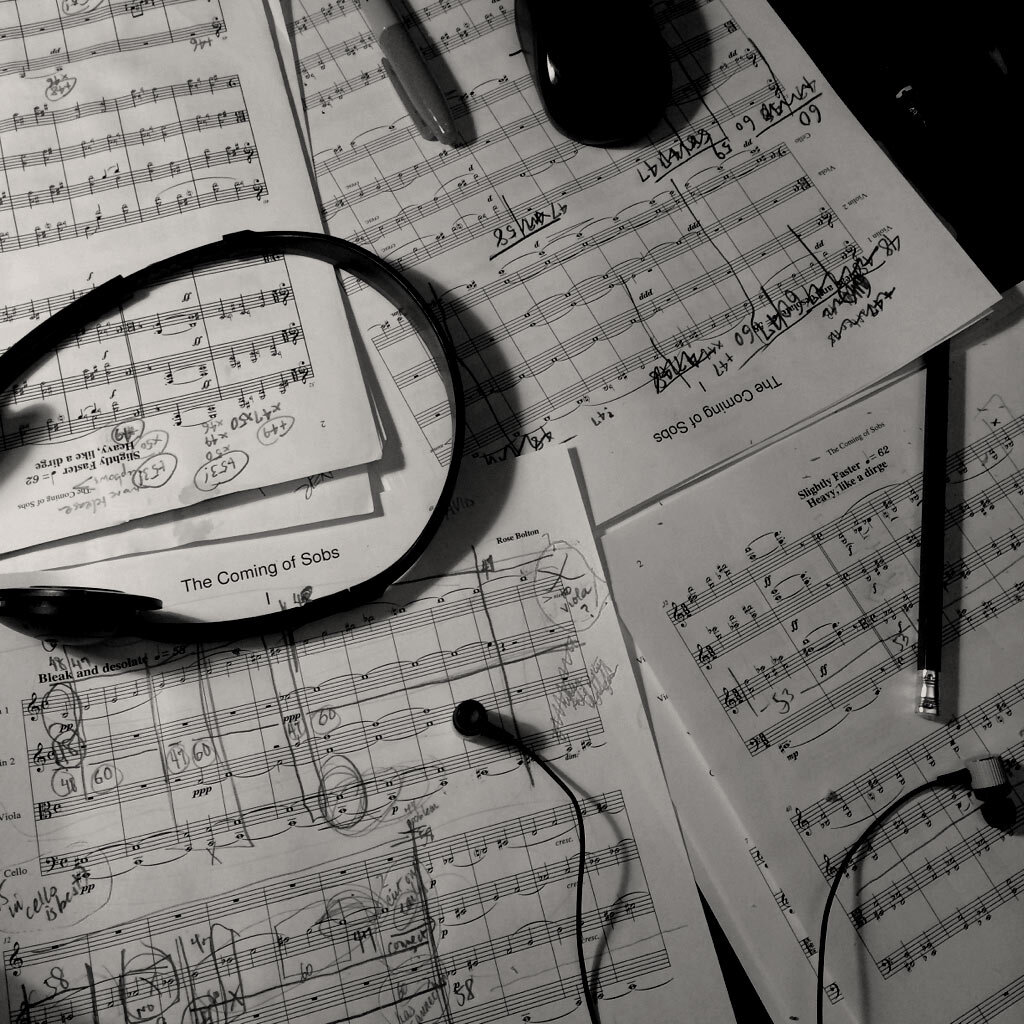
As something of a summing up of our Toronto years —performing regularly as a contemporary chamber ensemble — and to introduce a few of the extraordinarily talented composers we’d worked with during our Wychwood Period, we produced Bolton | Godin | Oesterle in 2019 in partnership with artist-led label, New Focus Recordings.
We were particularly pleased that Bolton’s “The Coming of Sobs” for String Quartet was nominated for the 2020 Juno Award for Classical Composition of the Year. Our next release is currently being planned.
“...an album to die for.” - WholeNote Magazine
Rose Bolton: The Coming of Sobs for string quartet (2011)* [1] I. Mysterious with Intensity 4:22 [2] II. Baroque Style passacaglia; Bleak 5:58 [3] III. Heavy (Euphoric, Tragic) 4:16
Scott Godin: all that is solid melts into the air for string quintet (2010/12)* Part One: The Modern Voice [4] I. The Heroism of Modern Life: Charles Baudelaire (1821 - 1867) 2:02 [5] II. The Prison of Modernity: Michel Foucault (1926 - 1984) 2:38 [6] Part Two: The Archicture of Modernity 12:12 III. The City of Tomorrow: Le Corbusier (1887 - 1975) IV. In the Forest of Symbols: Robert Moses (1888 - 1981) [7]
Michael Oesterle: Daydream Mechanics for string quartet (2001) 11:30

About the Album
In the mid-1990s a community of composers and performers came together at Montreal’s McGill University, loosely centred around composer Michael Oesterle and pianist Marc Couroux (who together went on to form the influential Ensemble KORE). This group included many of today’s leading Canadian composers such as Rose Bolton, Paul Frehner, Nicole Lizée, Scott Godin, and Brian Current, and dedicated performers from McGill’s Contemporary Music Ensemble (led by Bruce Mather and, later, Denys Bouliane), the members of the Bozzini Quartet and violist Pemi Paull. It was a transitional generation: the composers were moving away from avant-gardism and re-embracing popular forms, looking away from academia and creating their own groups while still dependent on the local institutions for support and recognition. It was a unique time of intense creation and collaboration that has had a lasting effect on the Canadian new music scene, as the composers’ lives and careers spread them to communities coast to coast, introducing their work to new audiences and a new generation of students.
Subsequently, similar groups of composers around the world began to come together and an international movement took shape characterized by "a common interest in moving outside of genre distinctions and traditional music industry infrastructures" and "collaborating with like-minded" performing ensembles. (New Amsterdam Records)
The three works presented here were selected to represent this Canadian voice in new chamber music. The works were championed by Music in the Barns from 2011 - 2015 as part of their vision to advance this voice within the international musical community.
Music in the Barns would like to acknowledge the Canada Council for the Arts, Ontario Arts Council and The Foundation for Assisting Canadian Talent on Recordings (FACTOR) for this opportunity to bring these chamber works to the world.
About the Compositions
The Coming of Sobs (2008) is the debut string quartet of acclaimed composer Rose Bolton. Championed by Music in the Barns, the three-part work was based on a premonition. Moving through extreme emotions from despair and anger, to jubilation and catharsis, uniquely-voiced double stops in all four instruments reveal sonic vibrations that create an "otherworldly" slightly detuned feel.
“The Coming of Sobs was written when I was becoming increasingly drawn to exploring intense emotions in music, and less interested in my previous approach, where harmony, melody and musical texture were more mathematically derived. While writing this piece I revisited Schoenberg's Verklärte Nacht, as well as the final movement of Tchaikovsky's 6th Symphony, two works that I had not listened to in some time. Working with Baroque forms, combining these with extreme emotions that one would hear in the late 19th century or 20th century, is how I developed the middle movement, which has a passacaglia like structure. In this way, I was exploring the combination of musical elements of late Romanticism, and the Baroque era.” - Rose Bolton
What is “modernity,” and what does it mean to be “modern?”
all that is solid melts into the air for string quintet flirts with this elusive concept, illuminating various facets and individuals associated with the modernist experience - Charles Baudelaire, Michel Foucault, Le Corbusier and Robert Moses. Originally conceived as a clarinet quintet, all that is solid melts into the air was premiered alongside a new quintet by American composer Elliott Carter. The music expresses the tactile, immediacy of modernity, incorporating a language stylistically linked to the world of Carter. - Scott Godin
“The phrase ‘Daydream Mechanics’ is taken from the title of a book by French-Canadian poet and novelist Nicole Brossard. This is the fifth in a series of pieces with this title, all of which use mechanistic devices to provide the base material. This quartet recalls the awkward adventures of childhood when the backyard seemed as full of fearsome possibilities as any unexplored geography. The simple mechanics of controlling one’s own maneuvers make a challenge of a cultivated wilderness.” - Michael Oesterle











